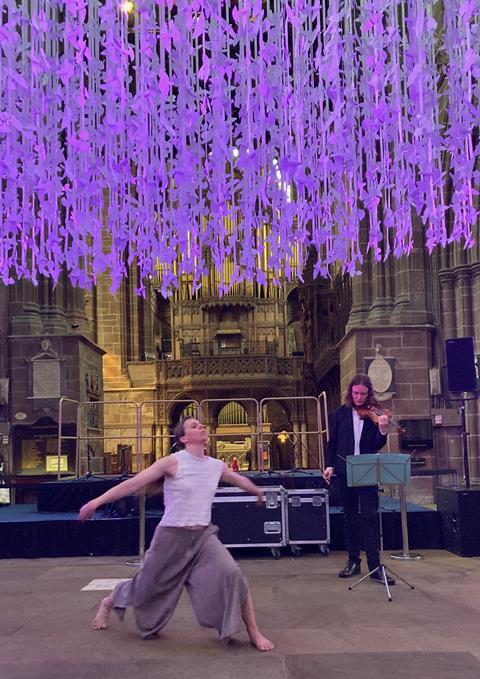Pwyll ap Siôn reports back from the Turing-inspired concert Sounding Bombe: Enigma Project at Chester Cathedral on 27 May 2025

‘This will blow your mind!’ An audience member whispered these words to me as the lunchtime popup concert featuring young Canadian violinist and composer Jack M Campbell was about to begin.
It seemed especially appropriate that the performance was taking place under a panoply of purple-hued paper peace doves at Chester Cathedral’s south transept.
With the eightieth anniversary of VE Day on 8 May still fresh in the minds of those present, Campbell’s Sounding Bombe: Enigma Project formed a neat connection. Taking its inspiration from Alan Turing’s efforts to crack the Nazi’s Enigma-machine during the Second World War, the English mathematician, computer scientist and codebreaker’s endeavours helped bring about an end to the conflict, securing lasting peace in Europe.
Prior to composing Sounding Bombe, Campbell visited the National Museum of Computing in Bletchley Park, where Turing and his team were stationed during the war. There, the violinist started piecing together a distinctive soundtrack from the mechanical sounds, pulsing rhythms, and clanging contrapuntal timbres of the bomba kryptologiczna: the Polish-designed machine developed by Turing to break German intelligence systems.
The electronic soundtrack provided a multimedia dimension to Campbell’s impressive fifty-minute composition for solo violin. Dancer Alexis Fletcher’s eye-catching choreography added further depth and nuance to the performance. Fletcher’s agile movements occasionally mirrored the creaky stop-start mechanisms of the codebreaking machine, while at other times the dancer’s sweeping parabola-like curves and shapes took on a unique and life-affirming spirit of their own. The same could be said about Campbell’s performance.
Like Albert Einstein and Max Planck, Turing was a competent violinist, and Campbell’s composition concluded with a subtle reference to the Irish song ‘Molly Malone’, which Turing is known to have played. It provided a poignant ending to a piece that began with Morse code-like pizzicato rhythms – Campbell’s music decrypting the language of words and symbols into the abstract language of sound and movement.
Sounding Bombe’s opening pizzicatos gave way to more extended, flowing lines, with pitch fragments forming larger chunks of data along the information sequence. Campbell’s violin moved effortlessly between resonant low notes, soaring lines and whispering flautando effects. Jagged double-stops, appearing to mimic gunfire sounds, eventually gave way to a chaconne-like section where Campbell’s precise ricochet patterns yielded a kaleidoscopic range of shifting harmonic colours.
As if taking its cue from Campbell’s edgy double-stops, the electronic soundtrack became suddenly stuck in its own dissonant minimalist loop. Perhaps the codebreaking machine was buckling under the pressure of information overload? Nevertheless, the appearance of ‘Molly Malone’ at the end – imbued with the plangent nostalgia of a Cape Breton folk melody – reminded us that beauty and ugliness, chaos and order, are often flip sides of the same coin.
Jack M Campbell’s Sounding Bombe: Enigma Project concludes its UK tour at the Brighton Fringe on 3 June, but if you can’t make it to any of the remaining performances, the prodigiously gifted young violinist will be presenting his work at the Edinburgh Fringe on 18 August 2025 at the Surgeons’ Hall, Stephenson Theatre. Be prepared to have your mind blown by Sounding Bombe.
Pwyll ap Siôn
Read: Concert review: Dover Quartet in Seattle
Read: Concert review: Pablo Ferrández (cello), Royal Liverpool Philharmonic Orchestra/Domingo Hindoyan
The number one source for playing and teaching books, guides, CDs, calendars and back issues of the magazine.
In The Best of Technique you’ll discover the top playing tips of the world’s leading string players and teachers. It’s packed full of exercises for students, plus examples from the standard repertoire to show you how to integrate the technique into your playing.
The Strad’s Masterclass series brings together the finest string players with some of the greatest string works ever written. Always one of our most popular sections, Masterclass has been an invaluable aid to aspiring soloists, chamber musicians and string teachers since the 1990s.
The Canada Council of the Arts’ Musical Instrument Bank is 40 years old in 2025. This year’s calendar celebrates some its treasures, including four instruments by Antonio Stradivari and priceless works by Montagnana, Gagliano, Pressenda and David Tecchler.












































No comments yet